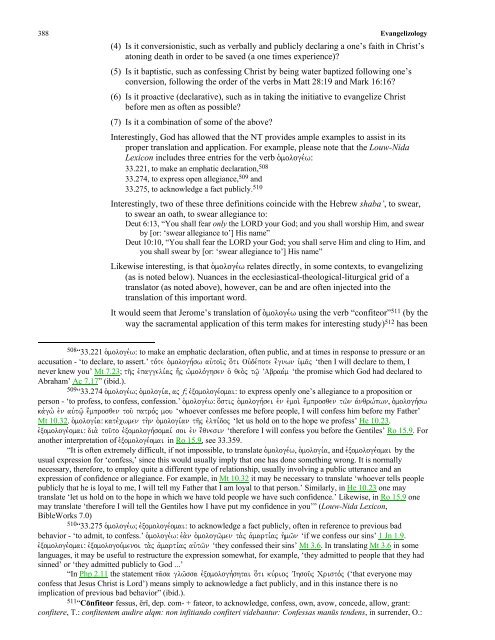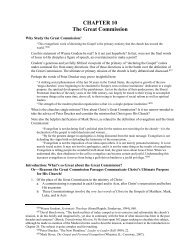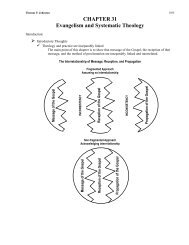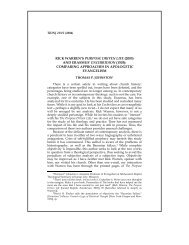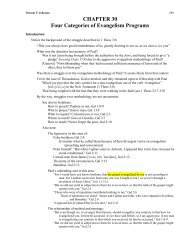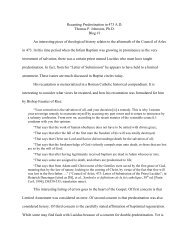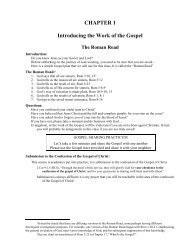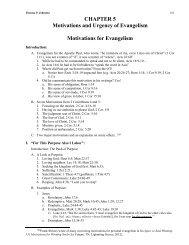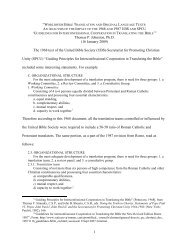CHAPTER 7 Defining Evangelizing - Evangelism Unlimited
CHAPTER 7 Defining Evangelizing - Evangelism Unlimited
CHAPTER 7 Defining Evangelizing - Evangelism Unlimited
You also want an ePaper? Increase the reach of your titles
YUMPU automatically turns print PDFs into web optimized ePapers that Google loves.
388 Evangelizology<br />
(4) Is it conversionistic, such as verbally and publicly declaring a one’s faith in Christ’s<br />
atoning death in order to be saved (a one times experience)?<br />
(5) Is it baptistic, such as confessing Christ by being water baptized following one’s<br />
conversion, following the order of the verbs in Matt 28:19 and Mark 16:16?<br />
(6) Is it proactive (declarative), such as in taking the initiative to evangelize Christ<br />
before men as often as possible?<br />
(7) Is it a combination of some of the above?<br />
Interestingly, God has allowed that the NT provides ample examples to assist in its<br />
proper translation and application. For example, please note that the Louw-Nida<br />
Lexicon includes three entries for the verb o`mologe,w:<br />
33.221, to make an emphatic declaration, 508<br />
33.274, to express open allegiance, 509 and<br />
33.275, to acknowledge a fact publicly. 510<br />
Interestingly, two of these three definitions coincide with the Hebrew shaba’, to swear,<br />
to swear an oath, to swear allegiance to:<br />
Deut 6:13, “You shall fear only the LORD your God; and you shall worship Him, and swear<br />
by [or: ‘swear allegiance to’] His name”<br />
Deut 10:10, “You shall fear the LORD your God; you shall serve Him and cling to Him, and<br />
you shall swear by [or: ‘swear allegiance to’] His name”<br />
Likewise interesting, is that o`mologe,w relates directly, in some contexts, to evangelizing<br />
(as is noted below). Nuances in the ecclesiastical-theological-liturgical grid of a<br />
translator (as noted above), however, can be and are often injected into the<br />
translation of this important word.<br />
It would seem that Jerome’s translation of o`mologe,w using the verb “confiteor” 511 (by the<br />
way the sacramental application of this term makes for interesting study) 512 has been<br />
508 “33.221 o`mologe,w: to make an emphatic declaration, often public, and at times in response to pressure or an<br />
accusation - ‘to declare, to assert.’ to,te o`mologh,sw auvtoi/j o[ti Ouvde,pote e;gnwn u`ma/j ‘then I will declare to them, I<br />
never knew you’ Mt 7.23; th/j evpaggeli,aj h-j w`molo,ghsen o` qeo.j tw|/ VAbraa,m ‘the promise which God had declared to<br />
Abraham’ Ac 7.17” (ibid.).<br />
509 “33.274 o`mologe,w; o`mologi,a, aj f; evxomologe,omai: to express openly one’s allegiance to a proposition or<br />
person - ‘to profess, to confess, confession.’ o`mologe,w: o[stij o`mologh,sei evn evmoi. e;mprosqen tw/n avnqrw,pwn, o`mologh,sw<br />
kavgw. evn auvtw|/ e;mprosqen tou/ patro,j mou ‘whoever confesses me before people, I will confess him before my Father’<br />
Mt 10.32. o`mologi,a: kate,cwmen th.n o`mologi,an th/j evlpi,doj ‘let us hold on to the hope we profess’ He 10.23.<br />
evxomologe,omai: dia. tou/to evxomologh,somai, soi evn e;qnesin ‘therefore I will confess you before the Gentiles’ Ro 15.9. For<br />
another interpretation of evxomologe,omai in Ro 15.9, see 33.359.<br />
“It is often extremely difficult, if not impossible, to translate o`mologe,w, o`mologi,a, and evxomologe,omai by the<br />
usual expression for ‘confess,’ since this would usually imply that one has done something wrong. It is normally<br />
necessary, therefore, to employ quite a different type of relationship, usually involving a public utterance and an<br />
expression of confidence or allegiance. For example, in Mt 10.32 it may be necessary to translate ‘whoever tells people<br />
publicly that he is loyal to me, I will tell my Father that I am loyal to that person.’ Similarly, in He 10.23 one may<br />
translate ‘let us hold on to the hope in which we have told people we have such confidence.’ Likewise, in Ro 15.9 one<br />
may translate ‘therefore I will tell the Gentiles how I have put my confidence in you’” (Louw-Nida Lexicon,<br />
BibleWorks 7.0)<br />
510 “33.275 o`mologe,w; evxomologe,omai: to acknowledge a fact publicly, often in reference to previous bad<br />
behavior - ‘to admit, to confess.’ o`mologe,w: eva.n o`mologw/men ta.j a`marti,aj h`mw/n ‘if we confess our sins’ 1 Jn 1.9.<br />
evxomologe,omai: evxomologou,menoi ta.j a`marti,aj auvtw/n ‘they confessed their sins’ Mt 3.6. In translating Mt 3.6 in some<br />
languages, it may be useful to restructure the expression somewhat, for example, ‘they admitted to people that they had<br />
sinned’ or ‘they admitted publicly to God ...’<br />
“In Php 2.11 the statement pa/sa glw/ssa evxomologh,shtai o[ti ku,rioj VIhsou/j Cristo,j (‘that everyone may<br />
confess that Jesus Christ is Lord’) means simply to acknowledge a fact publicly, and in this instance there is no<br />
implication of previous bad behavior” (ibid.).<br />
511 “Cōnfiteor fessus, ērī, dep. com- + fateor, to acknowledge, confess, own, avow, concede, allow, grant:<br />
confitere, T.: confitentem audire alqm: non infitiando confiteri videbantur: Confessas manūs tendens, in surrender, O.:


